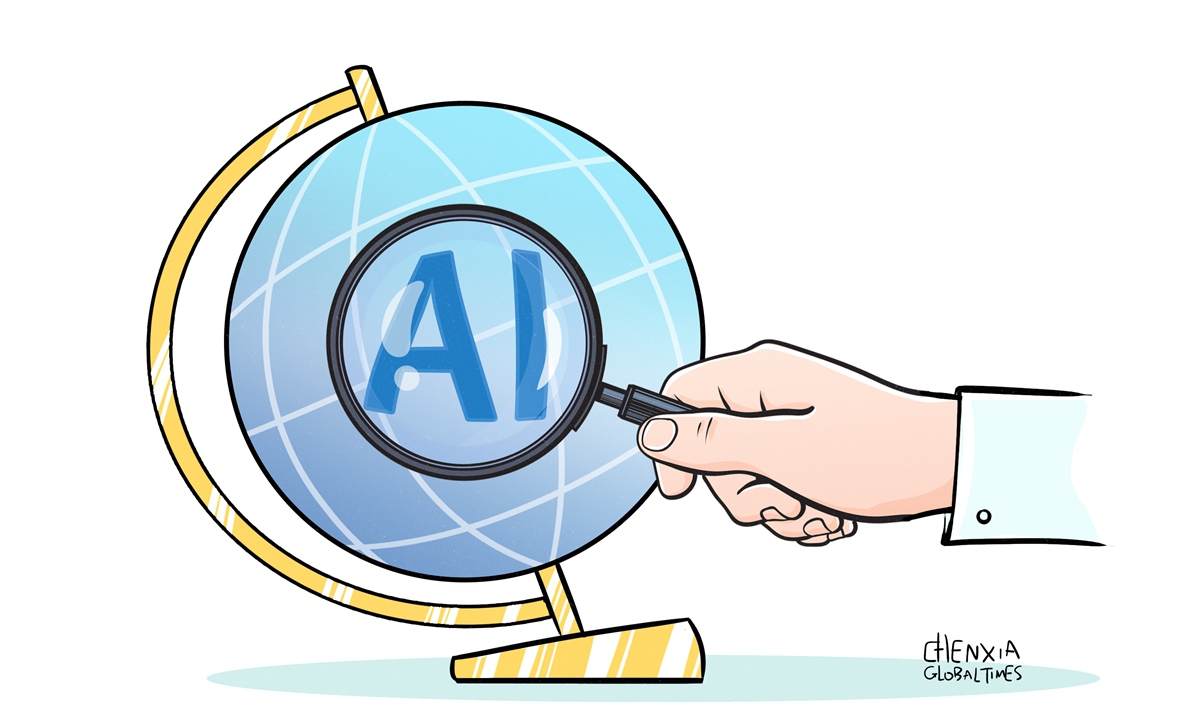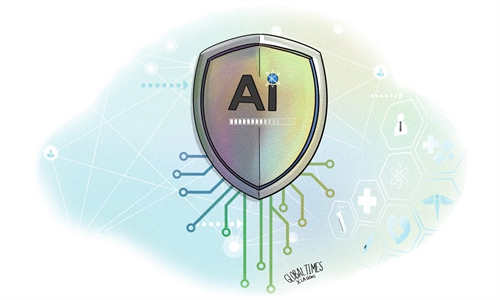
Illustration: Chen Xia/GT
With the rapid development of artificial intelligence (AI), the challenges and governance issues surrounding development are increasingly prominent. How to ensure that this technology is used for good and for all, rather than becoming "a game of rich countries and the wealthy," has emerged as a critical concern for the international community.It is against this background that the 2024 World Internet Conference Wuzhen Summit on Wednesday saw the establishment of a special AI committee, according to the website of the Cyber Administration of China.
The committee creates a new platform and opportunities to enhance international governance and cooperation on AI, as well as promoting the global sharing of AI development achievements. It also echoes the common desire of the international community to strengthen governance and cooperation in AI.
The development of AI technology has undoubtedly injected new vitality into the global economy while also presenting unprecedented challenges. On one hand, the widespread application of AI has significantly improved production efficiency, promoted industrial upgrading, and provided new momentum for economic growth. On the other hand, AI technology has intensified global technological competition and, in some cases, triggered geopolitical tensions.
Notably, certain Western countries are trying to suppress AI development in nations like China, seeking to maintain their leading position in the field through measures such as technological blockades and export controls. This approach bucks the trend of global technological advancement.
The progress of technology, especially in the revolutionary AI field, should by no means be distorted by geopolitical disputes. The development and application of AI needs to transcend narrow ideological differences to focus on solving the common challenges faced by humanity and enhancing the well-being and interests of all people. AI development cannot become a game for a few wealthy countries or a tool for geopolitical maneuvering. Instead, the development of this cutting-edge technology needs to encourage global participation and shared benefits, avoiding merely serving the interests of a small group of countries and exacerbating global inequality or widening the gap between rich and poor.
This is why the need for perfecting the global digital governance system is particularly urgent at this moment. It is essential to promote consensus on building a more equitable, inclusive and open global governance system for AI.
Of course, strengthening international governance and cooperation in AI is not an easy task. Differences in development levels, cultural backgrounds and values among countries increase the difficulty of cooperation to some extent. But it is still worthwhile for countries, on the basis of respecting differences and embracing diversity, to adopt an open, inclusive and cooperative attitude to jointly promote progress in the AI field. This will avoid geopolitical tensions caused by technological competition, and will promote balanced global economic development by narrowing the technological gap between countries.
To begin with, it is essential to establish unified global ethical standards for AI. The rapid advancement of AI technology has brought significant challenges related to ethics, privacy, security and more. The varying approaches to AI ethical standards across different countries and regions can impede global communication and cooperation in AI development. Therefore, creating globally consistent AI ethical standards and promoting adherence to shared ethical principles in AI research and application across nations is crucial to ensure that AI technology is harnessed for the greater good.
Moreover, it is crucial to promote the inclusive application of AI technology to ensure that its advances benefit all humanity. Countries need to enhance collaboration in AI research and development, application promotion and talent cultivation, facilitating the widespread use of AI across sectors such as education, healthcare, transportation and environmental protection. This approach will ensure that AI technology truly serves people around the globe and fosters inclusive global economic growth.
In summary, enhancing international governance and fostering cooperation on AI is key to ensuring that AI technology serves the greater good and effectively addresses pressing global challenges. This endeavor requires an approach that not only focuses on technological advances and innovations, but also pays attention to the ethics and social responsibilities associated with technology, ensuring that AI becomes a powerful driving force for global common development.



